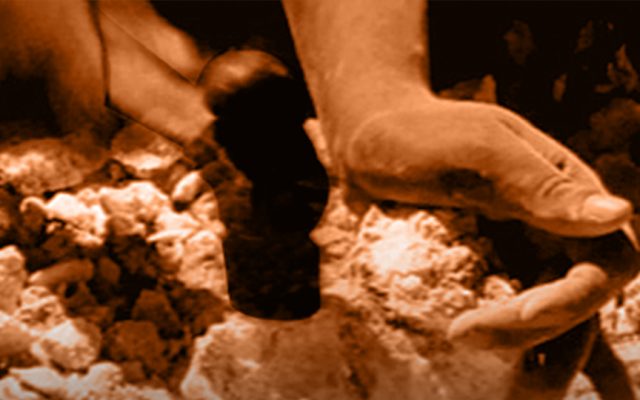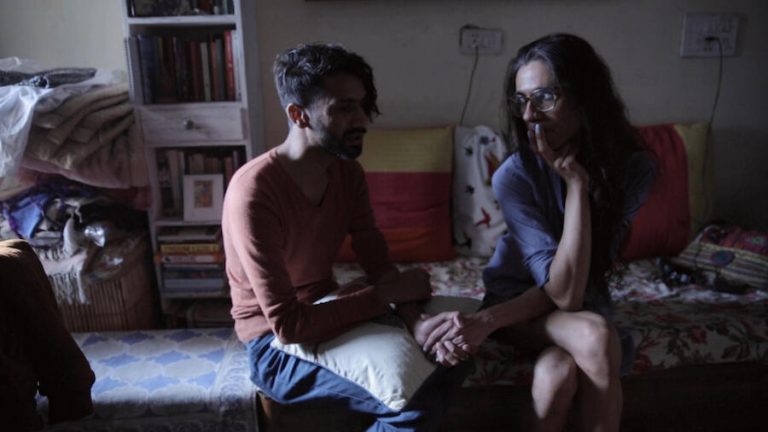These Hands

Captioned for d/Deaf and Hard of Hearing viewers
A rarely-screened gem of contemporary East African cinema, Flora M’mbugu Shelling’s These Hands bears witness to a day in the life of Mozambican female refugees working repetitive manual labour in a quarry outside Dar es Salaam. Through M’mbugu Shelling’s compassionate gaze, we see women of all ages working the open quarries with hand tools, simultaneously managing childcare and food preparation throughout the working day.
The film eschews commentary or a voice-of-god explanation, instead letting the images, rhythms and sounds convey all meaning. Of the film, M’mbugu Shelling has said: ”Certain things you can say with words and certain things you cannot find words for… I don’t want to offend my audience by telling them what they should see or feel.” Her approach to making These Hands has been considered ‘womanist’ in its approach to reclaiming representations of women of colour, whilst simultaneously deflecting traditional Western (mis)representations.
“M’mbugu-Schelling, like other womanist directors, seeks not to portray women and femininity as submissive or inferior, but to highlight experiences and the roles they play within the oppressive structures through which a given society operates, as well as to denounce these harmful structures. Although we do see in the film that the women and their work are being exploited, the lack of plot and the choice of songs they sing, coupled with the direct gaze of several of the women into the camera while dancing and doing other activities, allow these women to take up this participatory role and take control of what they want us to see and know.” – Taija Walker, 2018E
Flora M’mbugu-Schelling was born in Tanzania and attended the Tanzanian School of Journalism in Dar es Salaam. She studied and trained in Germany and France. Her documentary films include Kumekucha (From Sun Up – 1987), which won a gold metal at the New York International Film Festival, and Shida and Matatizo (1993); These Hands (1992), deriving its title from a poem she wrote, has received many awards, including the Joris Ivers Award and the Perugia Prize in Italy.
Carmen Thompson is a programmer, curator and creative producer based in Edinburgh, Scotland. Her interests centre around cinema from the African continent and the Black diaspora, perhaps most specifically at their intersections with non-fiction storytelling. She currently works as cultural curator and programmer for award-winning exhibitors We Are Parable, a programming consultant for Red Sea International Film Festival and as a producer for international sales & distribution company Aya Films. In her nearly 10 years in film exhibition and distribution, Carmen has worked with a range of organisations including Sheffield Doc/Fest, Africa in Motion (AiM) Film Festival, Realness Institute, Wellcome, Everyman Cinemas, The Africa Channel, New Black Film Collective and Film Hub Scotland. Carmen is as a programming associate for us at CAMPLE LINE, and is on the boards of Document Film Festival (chair), Glasgow Film and most recently the British Independent Film Awards (BIFA).
Khadea Santi is an artist in Edinburgh, exploring histories and storytelling through the use of creative workshops as a way to encourage space for self-exploration centred on lived experience. They are interested in critical autoethnography as a method that disrupts ideas on the subject/object dualism and Eurocentrism, instead, self-reflecting rooted in diasporic knowledge working across various media including writing, ceramics and sound. Recent work includes a 45-minute sound work Deep Lake Murmur 2022 commissioned by Radiophrenia, and a curated collection ‘May You Never Grieve Alone’ that explores spiritualism, land and memory through film, ceramic and writing.
These Hands
Dir. Flora M’mbugu Shelling
Tanzania, 1992, 46′, Kimakonde & Swahili + English & SDH subtitles
Tickets on a sliding scale: £5 / £3 / £2 / Free
Ticket guide available here
Introduced by programmer and curator, Carmen Thompson, and including an audio soundscape response to the film by Edinburgh-based artist Khadea Santi.
Watch at Cample:
Thurs 24 November, 7pm
Watch Online:
Fri 25 November - Fri 2 December
Let us know what you think
If you attend this screening and/or conversation, please take a moment to complete this short audience survey to let us know about your experience
Enjoyed the films?
If able to, please consider making a donation to support CAMPLE LINE
Supported by Film Hub Scotland, part of the BFI’s Film Audience Network, and funded by Screen Scotland and National Lottery funding from the BFI


